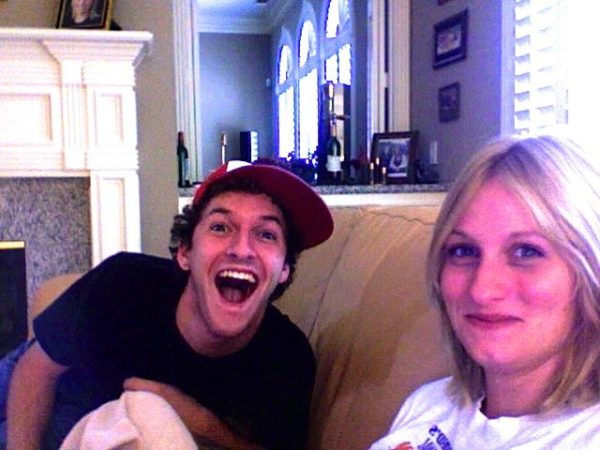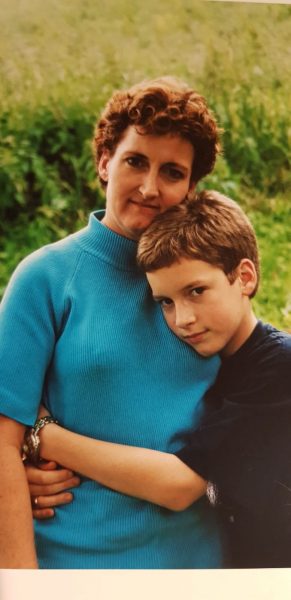This question was very difficult for me. For one, I was feeling a bit down that day, swept from pillar to post by yet another tidal wave of grief. But I also felt a connection to Tom’s story, to his son, Matteo, and the pain they both have endured. Even as I write these words, the lump in my throat revisits me, reminding me that my grief and theirs is still so very real and raw, an old sore that is picked at and picked at so that it refuses to heal.
Tom’s Questions
Dr. Medhus,
Two years ago I lost my 19-year-old son, my only child. As a journalist, I began writing about this experience, in part to cope with the grief. I have become inspired, though, by how much we can learn from the loss of a loved one and how this experience can teach hope and wisdom as well as inflicting such terrible pain. I have been impressed by your relationship to your son Erik. Would you be willing to speak with me, so that I might include you in the book on which I am working? I should add that I have an extensive track record as a journalist, writing for publications such as the New York Times magazine and publishing books with Random House and Simon & Schuster.
Thank you.
Tom
Tom’s Additional Information
Thank you so much. About contacting my son: my first name is Tom, my wife’s name is Suzanne, and my son’s name is Matthew (often shortened to Matt or Matteo). Matt died in Middletown, CT, the town in which my wife and I still live. I’d love to know if Matt is alright, wherever he is.
Frankly, until I lost my son, I was a skeptic and an extreme materialist, in the sense that I was content with the experiences and joys I had found in this world and uninterested in exploring anything beyond that. Then at age 13 Matt developed a case of clinical depression (both my wife and I have suffered from that, too). Medical treatment didn’t help Matt much — anti-depressants didn’t seem to work for him, and he was resistant to talk therapy. He had to fight his way through several years of real misery more or less on his own. By the time of his death, he seemed to be coming out of the depression, had a job at the local university that he liked and in which he had won the admiration of his supervisor (a PhD chemist) and he had a nice girlfriend with whom he was very close. But he had also, apparently, been experimenting with self-medication on an occasional basis. On the evening of September 3rd of 2008, he took an overdose of heroin.
There were some points of similarity to your experience, I think. I told Matt I was going to visit my mother across town (she was dying of lung cancer at the time and I was supervising her care). He asked how long I would be gone, and I told Matt I’d be back in 45 minutes. When I did arrive home, I called his name and got no response. I found the bathroom door locked from the inside and began to suspect something was wrong. When I climbed into the bathroom through an outside window, I found my son sitting on the toilet, dead, with his pants around his ankles and a syringe on the floor.
My life, and that of my wife changed forever that night. But I’m finding some good things in the aftermath of my losses (my mother died 3 weeks later, having held on in a hospice center so that she wouldn’t spoil the celebration of Matt’s life we held — she died, I discovered later, during the celebration). My former dreams of how my life might proceed became irrelevant, but this experience of loss has pushed me to explore the spiritual side of life. It has also freed me of fear — I feel I have little more to lose, nothing that I would mind parting with, and that is allowing me to pursue dreams and causes in ways I wouldn’t have dared to do during my more pragmatic days. These experiences of loss, by demonstrating how fragile and fleeting this life is, have also allowed me to feel joy as well as sorrow to an extent that I never had before.
As a writer, I want to try and share the good that can come out of loss, as a way of reaching out to others who are grieving. That is why your work and your journey are so particularly interesting to me. I would love to talk with you (by telephone, if that is convenient) to hear about your experiences since the death of your son.
Tom
Channeling Transcript
Me: This next one—you might have to bear with me, because I’m already choking up. (pause) It just reminds me of my little Erik.
Jamie: Take you time, Elisa.
Me: This is from Thomas. He lost his 19 year-old son, his only child…name is Matthew, but he’s also known as Matt or Matteo. I guess they’re nicknames of sorts. Matt died in Middletown, Connecticut where his mom and dad still live. Anyway, the circumstances were similar to yours, Erik, and (long pause) um, but he didn’t use a gun, and I think it was an accidental overdose. Tom just wants to know if Matt is okay wherever he is.
Jamie: He’s right here, and he says he always loved the name, Matteo. It’s funny, because Erik sort of walked him to the center of the room. He looks a little reserved. Matteo says he’s trying very hard to communicate with his father at the computer. And he wants to apologize for making the computer misbehave like skipped keys, screen blips or glitches, not sure what he’s saying.
Erik: He says his dad wants a story to heal himself.
Me: Well, actually, he’s a writer, a journalist. I can’t remember if he writes stories.
Erik: Matteo is having trouble working through that heavy grief. And so he’s trying his best to get through that. As soon as he can, he’ll be able to get his story told.
Me: Are you saying it’s hard for Matt to get through his dad’s grief to communicate or his own grief?
Erik: Yes, the dad is writing a story to heal his grief.
Me: This is incredible, Erik! I think he is writing some sort of story! So, any messages for him? This is the opportunity for Matt to do so.
Jamie (laughing): He says, “I really thank you for that. I thank you for everything you’re giving to us.” That’s sweet.
Me: Take your time, Sweetie. If there’s anything you want to tell your mom or dad, this is an opportunity.
Erik: He says that surprisingly enough, just your communication to people after giving them messages opens them up; it shows them the simplicity of how it is.
Me: Wow, I was actually wondering about that! Maybe it was channeled to me. It seems like once people get the healing from the communication from their deceased loved ones, uh, well it just seems like maybe they’re able to communicate better. Erik, do you suppose you can bring him forward in a dream or assist him in any way?
Erik (chuckling): Dude wants to leave a bigger mark than just a dream!
Me; Who does?
Erik: Matteo! You know how some people will leave a light layer of flour on a dark countertop, like a black surface?
Me: No, huh uh.
Erik: It’s kinda like you sift it. Then the spirit can put their hand marks, their fingers, and sometimes they can even spell words out and draw pictures!
Me: Wow, no! I’m going to try that!
Jamie: Yeah, I’ve seen some amazing photographs of work like this.
Erik: Matteo wants to interact that way so that they feel it’s more physical and not like a dream state, cuz his dad is kinda skeptical about this stuff.
Me: Oh, if I try it with you, can you send me messages?
Erik: Bring it on, Mom!
Me: Great!
Erik: Look, Matteo wants to send his own messages, but he definitely wants to say he loves his family, he’s sorry everyone had to put up with his shit, but he just forgot what he was to do, just like me, he got confused and forgot what he was there to work on–what his destiny was. He knows now, but he prefers to send the other messages himself. He’s kinda stubborn that way. I like him. He’s a nice guy, and he’s very happy here except he gets sad when his mom and dad get sad.
As a follow up, I’d like to say that I indeed tried the flour messaging technique–sort of a low tech answering machine. I was particularly excited since we just remodeled our 20 year-old kitchen and installed black granite countertops with pretty blue bits of mother of pearl. The next morning, there were kitty paw prints everywhere…in the flour on the unfloured surfaces, on the floors, I mean EVERYWHERE. Thosse kitties sure get around at night! Dang!



